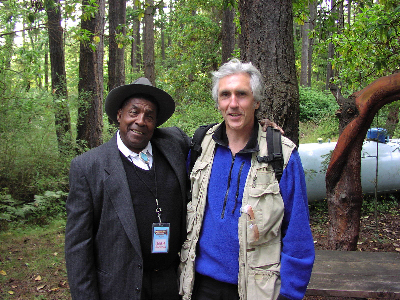|
John
Jackson
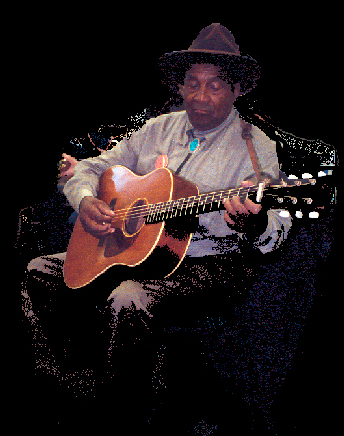 John Jackson was a
Bluesman. I use the term with reverence. It
refers to a special group of people, many surviving
life’s hardest blows while reaching deep within their
spirits to pull threads of beauty and truth from pain
and shadow. John Jackson was a
Bluesman. I use the term with reverence. It
refers to a special group of people, many surviving
life’s hardest blows while reaching deep within their
spirits to pull threads of beauty and truth from pain
and shadow.
As I grew to know them, bluesmen numbered among my
favorite people. By nature, they are complicated,
often conflicted, capable of howling with the devil
Saturday evening, then begging God’s love and mercy at
Sunday church service. They may be genuine,
helpful, unreliable, generous, poor, sharing,
unpredictable, inspired, daring, dangerous and
fun. Within this maze of contradictions,
they flow gracefully through life’s toils and
snares. Those who survive weave an amazing
tapestry of life’s struggles which alchemy imbues their
natures with compassion and awareness.
Friends feel blessed simply to be in their presence.
I considerd John Jackson to be my friend. Then
again, so did everyone. I was not a close friend,
just someone who crossed his path several times over the
course of a few years and sat to chat, perhaps even play
when opportunity allowed. John of course made
everyone feel special. His warmth and generous
spirit was in many ways like a parent’s embrace.
If you do your homework on John Jackson, you’ll find he
is listed as a Piedmont guitarist and one of the last of
the Songsters. By my reckoning, he played guitar
like a diamond cutter, hitting every note with
confidence and evidencing a personal style that was
beyond duplication if not admiration. He was a
National Heritage Award winner in 1986 and, in his later
years, traveled the world as honored guest at many
musical venues and blues events.
|
Click
image to hear John’s playing “Black
Snake Moan” as we sit and listen.
|
|
|
He was born February 25, 1924, in
Woodville, VA, and passed from liver cancer January 20,
2002, in Fairfax Station, VA. His speech and
vocalization as well as his performing style were an
embodiment of musical and linguistic history, proving
the astounding diversity of influences which pervaded
even the remote backlands of America over the past
century.
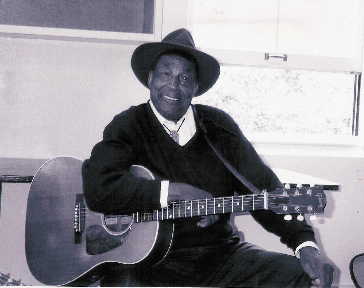 As 7th of 14
children, he came from a struggling family and never
finished first grade. When questioned regarding
his vast repertoire of songs, Jackson, would explain
since he could not read or write he was careful about
keeping everything up here, pointing to his head as he
spoke. When he performed, he was capable of
producing a never-ending array of songs but was equally
known as a consummate storyteller, possibly preserving
as many stories from the old hills as he did songs from
the bygone era. As 7th of 14
children, he came from a struggling family and never
finished first grade. When questioned regarding
his vast repertoire of songs, Jackson, would explain
since he could not read or write he was careful about
keeping everything up here, pointing to his head as he
spoke. When he performed, he was capable of
producing a never-ending array of songs but was equally
known as a consummate storyteller, possibly preserving
as many stories from the old hills as he did songs from
the bygone era.
While still a youngster, John
had opportunity to develop musically from his father and
mother who both performed at house parties and weekend
gatherings aiding the family’s survival. I’ve
heard John questioned on several occasions as to how he
learned the instrument and perfected his skills.
He said he was inspired by his parents and also by some
of the musicians that passed through over time.
Mostly, he benefitted from the commerce of traveling
salesmen, who would show up with large numbers of
records which poor folk could buy on time
payments. John said these records were his true
awakening as a guitarist, and he would sit for hours
analyzing various styles he encountered. Unlike blues
traditions from other regions of the country,
particularly the Mississippi Delta where the African
rhythmic connection is profound, Jackson’s influences
included personalities such as Blind Lemon Jefferson,
Mississippi John Hurt, the Carter family, and Jimmy
Rogers as well as the plethora of phenomenal ragtime
guitarists nurtured in the same region. I remember
John once sharing he had been learning the Jimmy Rogers
repertoire for years never aware Rogers was a white man
until later in life. None of that mattered to John
of course. He was following a muse which knew no
racial
distinctions.
|
Click
image to hear John explain how he
first started to learn the songs he
heard.
|
|
|
It was in the 1940's, while
still in his 20's, that John completely stopped
performing and, by his own explanation, pretty much laid
down his guitar, not really touching it for several
decades. There are various accounts as to why this
occurred. It is generally accepted that John, a
peaceful man, was uncomfortable with violent behavior
that sometimes flared at parties where he
performed. There is at least one report of his
brother using John’s guitar as a shield of defense,
fending off an attacker.
You may have heard the amazing re-emergence stories of
Son House, Mississippi John Hurt and Skip James. If not,
take a few moments and scan the Internet. Many of
the bluesmen from the previous century have simply
disappeared from history. At the time of the folk
revival in the 1960s, musical researchers and archivists
were doing everything they could to locate whoever
remained of those genius musicians. The successful
searches and rediscoveries of Son House, Mississippi
John Hurt and Skip James preserved a body of music
otherwise under threat of permanent extinction and
which, once rediscovered, inspired and propelled modern
music in ways which can still be heard today. If
their rediscovery is the stuff of musical legend, then
the quintessential legend of rediscovery may belong to
John Jackson. It was in the mid 60's when an
extraordinary string of events unfolded propelling him
virtually overnight into a personal meeting with
Mississippi John Hurt and subsequent opportunity to
perform. Within weeks, he was invited to do his
first recording session (where he estimates having
recorded 90 songs). I heard the story many times
and never ceased to enjoy it. John, ever
courteous, allowed me to record it at one of those
sittings. Rather than hear my pale summary, lets’s
have a visit from John, who in his own words will tell
you exactly what happened.
|
Click
image to hear the story of John’s discovery.
|
|
From the moment of his first
emergence, John’s extraordinary talent was widely
recognized and appreciated. He had a guitar style
which was singularly unique and included a vast
repertoire of traditional songs setting an inimitable
standard for those attempting to follow. I
remember once sitting in a room full of guitar players
trying to play along with John, struggling to understand
why we appeared to be missing some bass notes and
runs. It was only after considerable dialogue and
John’s willingness to break his playing down to its
minuscule elements we realized he was back-stroking with
his right thumb against the bass strings, a technique
virtually unique to his attack. Again, he was a
self-evolved American original.
In the personal moments I had with John, we had
opportunity to discuss a bit of his life. There
was his marriage to Cora Lee, and his pride in having
built the home he lived in. In his life, he
reportedly worked as a farmer, chauffeur, cook, butler
and gravedigger. Even as his performing career
evolved and gave him opportunities to be appreciated
around the world, he would not infrequently return to
the normal affairs of life and to the things he had
always done. For him, there was joy in the
ordinary. I understand he even continued to dig
graves for friends who passed in the later years.
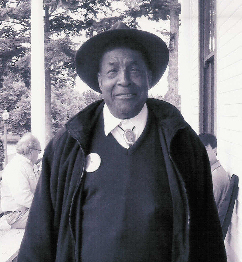 Most importantly (for me),
John Jackson was an avatar of human spirit. As a loving
and compassionate human being, he set the measure for
proper conduct for those with a mind to follow. Most importantly (for me),
John Jackson was an avatar of human spirit. As a loving
and compassionate human being, he set the measure for
proper conduct for those with a mind to follow.
Walk with me for a moment as I share a remembrance in
testament.
The year was 2001, the location Port Townsend, WA.
This was the annual mid-summer week of blues workshops
and performances which culminated in Saturday evening
performances by the headliners (of which John was
usually top bill).
Without getting into the details, I had taken ill prior
to my attending Port Townsend. There was a surgery
just days before I scheduled to leave and I was about to
cancel when my friend Art Sartwell thought it would be a
good idea for me to go anyway, if only to convalesce in
a healthy surround (His words, not mine. Spending seven
days and nights with hard-playing non-sleeping musicians
would strain anyone’s stamina). Art literally
picked me up and carried/drove me there. Though it
was a battle, Art’s plan proved to be the right course
for the week. Despite my discomfort, I had
opportunity for considerable growth and exposure to
musical ideas that would have been lost had I stayed
home.
By Saturday evening’s finale,
while still looking much the ghost, I was ambulatory and
took opportunity to attend the concert. John had
just finished his performance. Once he was done, I
stepped outside to get some air. I was recovering
but still worn and sensitive. The performance venue at
Port Townsend is the Ft. Worden McCurdy Pavilion.
This is actually a converted dirigible hangar, which is
popular throughout the year for various types of musical
performances. Stepping out, I went behind the
pavilion, where I knew from experience several picnic
tables were placed for performers to relax quietly in
the shade of nearby trees. Almost simultaneously
John emerged from the main stage exit and came over to
chat. He commented I looked under the weather and
was concerned. He noted I was not dressing warm
enough as it was a cold evening (every evening in Pt.
Townsend was cold to John, who was accustomed to
blistering Piedmont summers). I let him know how
much I enjoyed his performance. John of course was
always impeccably dressed, usually with Stetson
hat. Stories abound as to how it is impossible to
take a bad photograph of John Jackson. He always
looked just about perfect, and those meeting him for the
first time would be careful to note what he wore, if
only to adopt style into their own lives. That’s
how he was that evening. As we got to talking, I
commented to John that, in the several years I’ve had
the pleasure of his acquaintance, I never had the sense
to get a photograph of us together, which I hoped to do
before we parted that evening. He asked if I had a
camera; I confirmed. He said to take it out, and the
first person we saw we would get to take the picture.
We talked for several minutes, then Trish, his friend
and manager, came by, letting John know it was getting
late and he was due back at the guest house.
Trish was always concerned for his well being.
John stood up, and in his inimitable accent said,
“Trish, before we go, here’s Bill’s camera. Let’s
get a picture of me and Bill together”, and Trish was
happy to oblige. She took the camera and backed up
to shoot. John suddenly began to gasp. His
hat tilted askew and nearly dropped off. He
stumbled a few steps, staggering. I stood
horrified, thinking John was having a coronary.
This man, who at every turn had appeared to be in
glowing health, was now choking, clutching his throat
and tearing his collar open. I glanced at
Trish. She was ripping through her bag, then ran
up to John with some sort of spray, stood him up and
administered. John almost immediately stabilized
and stood motionless for a few seconds, when Trish said,
“We’d better go, John.” John mumbled
imperceptibly, still dazed, stood, took a step or two
away, then said, “Just a second, Trish, we didn’t get
Bill’s picture.” He turned about, brushed
off his hat, shook his suit top once or twice, put his
hat back on and before my disbelieving eyes re-emerged
in full regalia.
I was speechless. Trish took the picture. I
remained silent, started to back away and John said,
“Just a second, let’s take another one, just to make
sure he’s got one.” She snapped a second shot, and
of the two, this is my favorite.
I know, I know, I look like the one who
is near death.
We shook hands goodbye. I was heading out that
night, and John was leaving early the next
morning. It was the last I saw of him. I did
not know how ill he was on that day, politeness barred
my asking, but I had my suspicions. Six months
later, he was gone.
The world is a scary place, riddled with
uncertainty. We sometimes fear living, and we
sometimes fear death. Our lives are filled with
talking heads who purport to have life’s answers for
us. We, the ever unknowing. Somewhere in the
currents about us, are folks like John Jackson, who
touch with light and joy all they meet. Despite
his humble beginnings, and even his humble endings, John
remains a beacon of human potential for all who
understand that humility, kindness, compassion and
generosity will stand one true...always
|
Here’s
how John appeared shortly after his
re-emergence.
|
|
|
|

 John Jackson was a
Bluesman. I use the term with reverence. It
refers to a special group of people, many surviving
life’s hardest blows while reaching deep within their
spirits to pull threads of beauty and truth from pain
and shadow.
John Jackson was a
Bluesman. I use the term with reverence. It
refers to a special group of people, many surviving
life’s hardest blows while reaching deep within their
spirits to pull threads of beauty and truth from pain
and shadow. 
 As 7th of 14
children, he came from a struggling family and never
finished first grade. When questioned regarding
his vast repertoire of songs, Jackson, would explain
since he could not read or write he was careful about
keeping everything up here, pointing to his head as he
spoke. When he performed, he was capable of
producing a never-ending array of songs but was equally
known as a consummate storyteller, possibly preserving
as many stories from the old hills as he did songs from
the bygone era.
As 7th of 14
children, he came from a struggling family and never
finished first grade. When questioned regarding
his vast repertoire of songs, Jackson, would explain
since he could not read or write he was careful about
keeping everything up here, pointing to his head as he
spoke. When he performed, he was capable of
producing a never-ending array of songs but was equally
known as a consummate storyteller, possibly preserving
as many stories from the old hills as he did songs from
the bygone era. 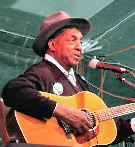
 Most importantly (for me),
John Jackson was an avatar of human spirit. As a loving
and compassionate human being, he set the measure for
proper conduct for those with a mind to follow.
Most importantly (for me),
John Jackson was an avatar of human spirit. As a loving
and compassionate human being, he set the measure for
proper conduct for those with a mind to follow. 